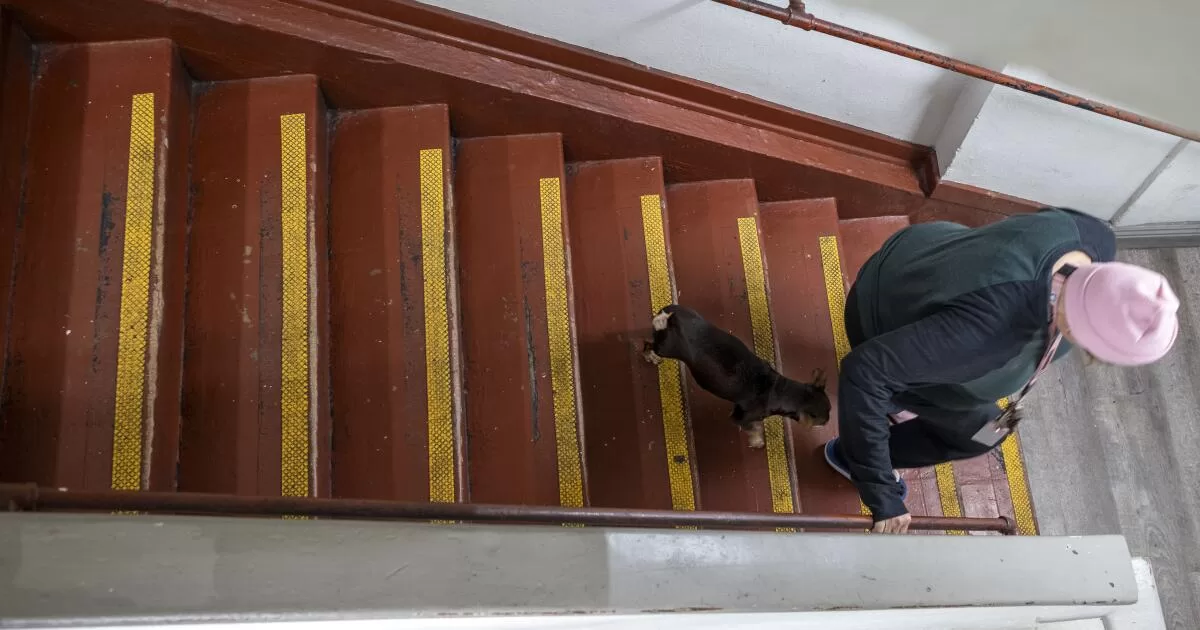The nonprofit AIDS Healthcare Foundation will pay current and former tenants of a Skid Row residential hotel $575,000 to resolve a long-running class-action lawsuit over conditions at its property.
Residents of the Madison Hotel alleged pervasive problems, including mold, vermin, and plumbing and electrical issues that they said the foundation has failed to fix.
The case was filed in Los Angeles County Superior Court in 2020, and the settlement was reached Monday, when the trial was scheduled to begin. A series of rulings from Judge William Highberger had narrowed the tenants’ claims so that they could seek rent reimbursements only due to conditions in the building’s common areas. Most of the 200 residents in the century-old, single-room occupancy hotel share bathroom facilities on each floor.
Jennifer Kramer, an attorney representing the tenants, said the amount of the settlement represents about 25% of rent paid during the 4½ year-period at issue. Residents who lived at the Madison the entire time would get close to $5,000 each, she said.
“We think we worked out a deal that was just as good as if we went to trial,” Kramer said.
The figure does not include attorneys’ fees, which the plaintiffs’ lawyers continue to seek.
The settlement requires Kramer to provide a statement on tenants’ behalf acknowledging that the foundation has invested significant resources into improving and upgrading the Madison as part of an effort to improve conditions in Skid Row.
The foundation paid $8 million for the property in 2017. Foundation officials say they’ve since paid $7 million in repairs and upgrades to the Madison.
Foundation spokesperson Jacki Schechner said the settlement “fully vindicated” the nonprofit, pointing to Kramer’s statement.
“The small payments made to 300 residents recognized that they experienced certain hardships while the building was being improved,” Schechner said in a statement.
Besides the financial settlement, the agreement requires the foundation to consult with experts and receive training on maintenance and management issues at the Madison. The foundation also agreed to hire a consultant to assess the building’s elevator.
Last year, the foundation paid at least $832,000 to settle a separate lawsuit from elderly and disabled tenants who alleged they were stuck in their apartments or had to sleep in the lobby because of the elevator’s failures. Since the settlement, the elevator has continued to malfunction.
In April, the foundation won a $1.5-million default judgment against the Madison’s prior owner, who the nonprofit alleged failed to disclose the elevator’s condition.
Since buying the Madison, the nonprofit, which received $2.5 billion in revenue last year largely from its chain of pharmacies, has acquired more than a dozen underused low-income buildings in Los Angeles and worked to renovate them and lease rooms to tenants.
A Times investigation last year found that many of the foundation’s more than 1,300 residents live in squalid conditions, with dozens under the threat of eviction.
The foundation still faces multiple lawsuits from its tenants over conditions at the Madison and elsewhere.
The foundation is involved in multiple initiatives on the November statewide ballot. It’s sponsoring Proposition 33, which would expand rent control in California after two similar initiatives failed in 2018 and 2020. It’s also defending itself against Proposition 34, which is financed by the California Apartment Assn., the foundation’s opponents in the rent control fight. If passed, Proposition 34 would in effect ban the foundation from funding political and housing campaigns.
